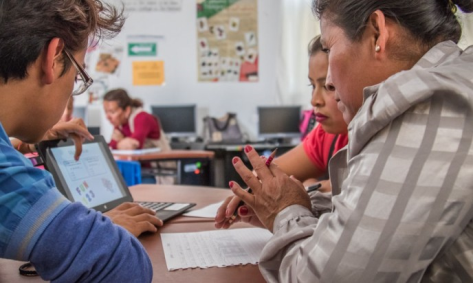
Despite advancements in the global literacy agenda, 750 million adults – two-thirds of whom are women – still lack basic reading and writing skills. The contribution of information and communication technology (ICT) to the achievement of youth and adult literacy – under the notion of ‘learning anywhere, anytime’ – plays a key role in improving the well-being of vulnerable populations, contributing to employability and facilitating active participation in society.
For this reason, the UNESCO Institute for Lifelong Learning, in collaboration with UNESCO Field Offices in Bangladesh, Egypt, Ethiopia and Mexico, and funded by the Microsoft Corporation, launched the project Advancing Mobile Literacy Learning to develop teaching and learning strategies that use digital solutions.
In Bangladesh, literacy lessons were supported by mobile devices and software to improve women’s livelihood skills. In Egypt, women benefitted from lessons that used the curriculum Al Mar’ah Wal Hayah (Woman and life), which enhances women and girls’ literacy and life skills in connection to health, community participation and communication. A new literacy and numeracy digital learning application was developed to support this curriculum. In Ethiopia, community learning centres used mobile devices and audio-visual technology to deliver lessons related to health, agriculture, basic technology, civics and income-generating activities. In Mexico, learners in disadvantaged urban communities benefitted from digital literacy materials that were created, collected and uploaded on mobile devices to support their transition across basic literacy modules of the National Institute for Adult Education curriculum.
Across all of the projects, facilitators demonstrated the key role that they can play in quality learning and in developing the well-being of learners in their communities. When the project recently concluded, a total of 113 facilitators and 1,463 learners (aged 10 and over) benefitted from AMLL activities in the four participating countries. Ten principles emerged from the project as key to the successful use of ICT for strengthening literacy:
Develop the capacity of facilitators to use digital technologies as a pedagogical tool.
Cultivate needs-based learning materials in line with local resources and linguistic contexts.
Allocate time for testing and fine-tuning material according to learners’ needs.
Encourage peer-to-peer learning based on shared devices as a way to address device availability.
Support lending schemes so that devices can be used flexibly as part of blended-learning strategies.
Use devices as pedagogical tools rather than as substitutes for teaching and learning activities.
Think creatively with regard to internet connectivity and electricity provision: for example, consider using bicycles to transport Wi-Fi routers and rechargeable multimedia projectors from one community to the other.
Build on intergenerational approaches that strengthen a culture of literacy learning among all family members and the community.
Design and use standardized assessment instruments to establish baseline data and evaluate the progress and impact on learning outcomes.
Strengthen community learning centres as resource centres for the development of a variety of skills relevant to the lives of learners.
The above recommendations are pivotal for improving the quality of learning with the use of ICTs and thus for opening further educational opportunities for those who need it the most.
‘Learning and using things like a laptop and mobile phone made a difference: Now, I am able to search for what I want to learn on my own.’ (AMLL female learner, Egypt)
Posted on :
Feb 18, 2019